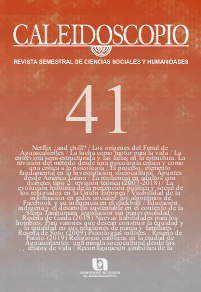Indigenous education and sustainable development in context of the Sierra Tarahumara: Legislation without transversality
DOI:
https://doi.org/10.33064/41crscsh1821Keywords:
indigenous education, educational legislation, sustainable development, Sierra TarahumaraAbstract
The review of the international legal framework of the Mexican Republic and the State of Chihuahua, related to sustainable development and indigenous education. The study is designed to know the legal concatenation of indigenous education with the protection of the environment and the sustainable development of indigenous peoples located in the Sierra Tarahumara. This territory has a high biodiversity. It also offers multiple ecosystem services: water, soil, minerals, cultural and geological landscapes, which are used by tourism, mining and agricultural activities and part of the lands of the indigenous raramuli, o'dami, o’óba and wuarijó. The work enunciates various laws that are relevant to culture and the environment, indigenous education and sustainable development. These norms give meaning to public educational policies of federal and state character in twelve municipalities of the Sierra Tarahumara.
Downloads
References
Cazar, O. (2009). Identidad personal de docentes de telesecundaria [Tesis de Maestría]. Chihuahua: Centro Chihuahuense de Estudios de Posgrado.
CONANP, GEF, PNUMA y WWF. (s/f). Proyecto Tarahumara Sustentable. Recuperado de http://www.tarahumarasustentable.mx/
Dirección General de Educación Indígena, SEP; SEB. (2017). Programa de Lengua Ralámuli. Ciudad de México: SEP. Recuperado de https://www.planyprogramasdestudio.sep.gob.mx/descargables/prog-estudio/Programa-de-estudios-Ralamuli-WEB-2017.pdf
Herrera, A. M. (2011). Índice del Reemplazo Etnolingüístico en Chihuahua, en F. J. Mancera-Valencia, (Coord.), Atlas del Patrimonio Cultural del Estado de Chihuahua. Instituto Chihuahuense de la Cultura. Chihuahua: Gobierno del Estado de Chihuahua; ISAD; INEGI; INAH-Chihuahua; Misiones Coloniales, A.C.; SEMERNAT; CONACULTA.
Mancera-Valencia, F. J. (2012). Geografía histórica de la educación pública en Chihuahua, siglos XIX y XX; la distribución del patrimonio cultural escolar. en: F. J. Mancera-Valencia (Coord.), Patrimonio cultural escolar de Chihuahua (págs. 89-113). Chihuahua: CONACULTA.
Mancera-Valencia, F. J. (2016). Descolonización de las Epistemologías Locales-Regionales desde la Pedagogía Sociocultural [Tesis doctoral]. Chihuahua: Instituto de Pedagogía Crítica.
Mayagoitia Padilla, E. A. (2011). Educación en el medio indígena de Chihuahua. IE Revista de Investigación Educativa de la REDIECH, 2(2), 33-41. Recuperado de https://rediech.org/inicio/index.php/biblioteca/articulos/item/download/24_dc8bf9168bf34b82e344ac90902816fc
Merino Rascón, M. (2007). El Consejo Supremo de la Tarahumara. Organización y resistencia (1939-2005). Chihuahua: Doble Hélice Ediciones; PACMyC.
Ortiz, F. J. (2014). Bilingüismo e interculturalidad en escuelas indígenas del estado de Chihuahua [Tesis de maestría]. Chihuahua: Centro de Investigación y Docencia.
Ortiz, F. J. y Mancera-Valencia, F. J. (2016). Prácticas culturales rarámuri en una secundaria intercultural en la Tarahumara. RECIE. Revista Electrónica Científica de Investigación Educativa, 3(1). 161-169. Recuperado de http://www.rediech.org/ojs/2017/index.php/recie/article/download/197/288/
PNUD. (s/f). Objetivos del desarrollo sostenible. La Paz: PNUD. Recuperado de http://www.bo.undp.org/content/bolivia/es/home/about-us/contact-us.html
SEECH. (s/f). Estadísticas. Portal Web de Servicios Educativos del Estado de Chihuahua. Recuperado de http://seech.gob.mx/estadistica/2019-index.html#
UNESCO. (1990). Declaración mundial sobre educación para todos. Nueva York: UNESCO. Recuperado de http://www.unesco.org/education/pdf/JOMTIE_S.PDF
Published
How to Cite
Issue
Section
License
Licencia Creative Commons Atribución-NoComercial-CompartirIgual 4.0 Internacional
El lector es libre de compartir o adaptar el material en cualquier medio o formato bajo las condiciones siguientes: (a) debe reconocer adecuadamente la autoría, proporcionar un enlace a la licencia e indicar si se han realizado cambios; (b) no puede utilizar el material para una finalidad comercial y (c) si remezcla, transforma o crea a partir del material, deberá difundir sus contribuciones bajo la misma licencia que el original.
Resumen de la licencia
https://creativecommons.org/licenses/by-nc-sa/4.0/deed.es_ES
Texto completo de la licencia
https://creativecommons.org/licenses/by-nc-sa/4.0/legalcode
Cada autor es responsable del contenido de su artículo. En el caso de un texto colectivo, el primer autor asume la responsabilidad intelectual de los resultados del proceso editorial; los autores son responsables de obtener la licencia de autor para reproducir materiales gráficos o fotográficos que pertenecen a terceros.
Los autores asumen plena responsabilidad en el caso de falsificación de datos o falta de autenticidad en la investigación. Se comprometen, también, a no reutilizar trabajos ya publicados, total o parcialmente, para presentarlos en otra publicación.
Estas condiciones aplican tanto a la versión impresa como a la versión electrónica de la revista.


















